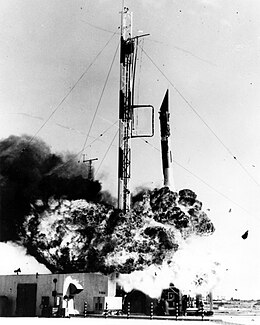Today is the anniversary of a rather dubious event in the history of the American space program. It could be summed up with one word: oops.
On December 6, 1957, the United States prepared to launch an artificial satellite called Vanguard TV3, or simply Vanguard. It was going to the American response to the Sputnik launch of two months earlier. The launch had been hyped for weeks, and it was getting all kinds of media coverage. The launch of Sputnik had been a big surprise, and a major embarrassment for the United States. Theoretically the United States was the world leader in technological innovation. Why then wasn’t the first artificial satellite an American one?
OK, so the Soviet Union got the jump. However, Sputnik was never more than a proof of concept vehicle. Sputnik’s primary function was to transmit a series of signals from low earth orbit to see how satellite communications operated. It also had an experimental radio camera, which was a prototype for devices planned for future satellites. It wasn’t a spy satellite or weapon targeting system, as some of the urban legends of the time said. It was a test vehicle. But even so, it was a major political coup for the USSR. They caught the United States with their pants down!
Well, the USA wasn’t going to let this stand. So Vanguard was designed to actually do some important stuff. It had a test relay signal of it’s own, but it also had some experimental receivers and transmitters that would later be used in communications satellites. Also, it was going to travel to a higher orbit than Sputnik, where it could be kept operational for a longer period of time, and serve as a test for a variety of other ideas.
Perhaps Vanguard wouldn’t be the first artificial satellite to orbit the earth, but it would be the first to do something truly important. And the USA was quick to point that out, and they were going to make sure the world knew it. Just about every news service in the world had someone at Cape Canaveral that morning to watch Vanguard rise into the sky, and outshine Sputnik.
Two seconds after liftoff, after reaching an altitude of roughly four feet, the rocket failed, and collapsed to the ground. As embarrassing as the Sputnik launch had been, this was a complete humiliation. Given that the United States had been touting Vanguard as proof of its technical prowess, the very public and very complete failure of the launch vehicle made the United States an international laughing stock.

If Vanguard hadn’t had so much hype, the launch would have received little notice, and might have been written off as just another missile test. Several newspapers dubbed the launch “Kaputnik.” A short time later, as a cruel joke, the Soviet Union asked the United Nations to see if the United States qualified for international relief funds allocated to “underdeveloped nations.”
The United States did successfully launch an artificial satellite in January, called Explorer 1, and the laughing died down. Explorer was launched with little or no fanfare, and wasn’t given any until after it was successfully in orbit. Furthermore, Explorer achieved more than earlier satellites, by performing a series of scientific experiments. The Explorer program confirmed the existence of the Van Allen belt, for example.
In a humorous twist, the Vanguard TV3 satellite itself was blown clear of the exploding rocket and was later recovered, with its transponder still working. An analysis of the damaged satellite resulted in several design revisions to both the satellite and the launch vehicle. Other satellites from the Vanguard series were later launched successfully and generally had good results. One of them, Vanguard 1, is still aloft, having logged over 50 years in orbit. The damaged TV3 satellite couldn’t be repaired, but is now on display at the Smithsonian Air and Space museum.
If there is a moral in this story, it’s that hubris is generally not a good thing, and that caution, prudence, and patience usually get better results. This is something that both the United States and the Russians have needed to be reminded of over the years.

